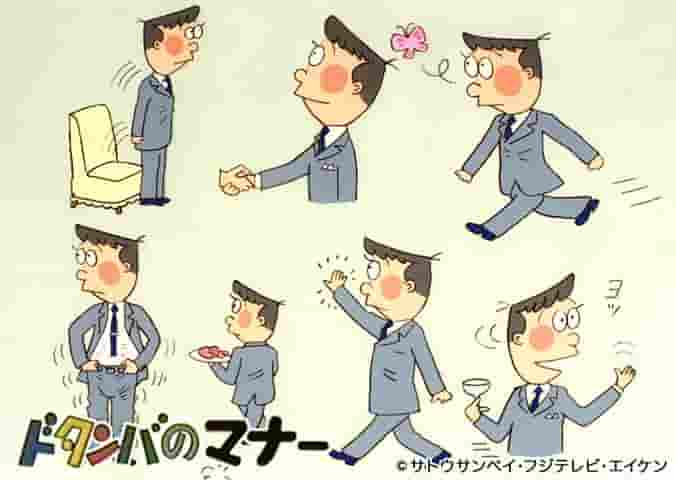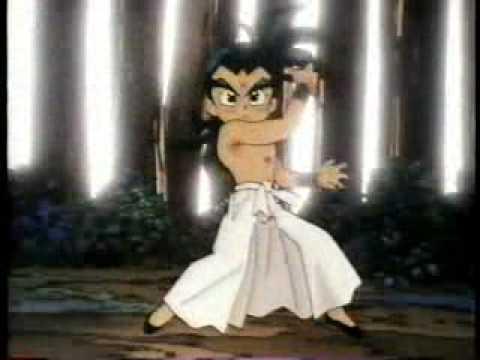Dotanba Manners: A Deep Dive into Anime Politeness and Etiquette

"Dotanba Manners": A mix of laughter and learning■Overview of the work"Dotanba no Manners" is a TV anime series that aired on Fuji TV from October 3, 1984 to March 28, 1987, every Wednesday from 10:54pm to 11pm. The anime is based on the manga column of the same name by Sato Sanpei, with episodes 179 and 180 based on the column "Smart Japanese" published in Shincho Bunko. There are 279 episodes in total, and each episode is only 6 minutes long, but it provides viewers with laughs and learnings. ■ Story"Dotanba's Manners" depicts the failures of Dotanba, a slightly clumsy businessman who is scolded by his superiors at work, dismayed by clients when entertaining clients, and mocked by foreigners at parties. As he repeatedly violates etiquette in various places and situations, viewers can laugh and learn useful manners for everyday life. Dotanba's failures will evoke sympathy from viewers, while also providing an opportunity to reexamine their own manners. ■Explanation"Dotanba no Manners" started out as an educational anime that introduced and explained a variety of manners, from practical to recreational. When it first aired, it was aired three times a week, but was later changed to twice a week. It faithfully reproduces the atmosphere of the original's simple yet soft illustrations, and uses live-action footage alongside the animation to provide viewers with a fresh perspective. The cast is made up of only two people, Masataka Sako as Dotanba and Ryoko Tateishi as the narrator, who sometimes play multiple roles. ■Cast
■ Main staff
■ Main CharactersDotamba: A clumsy office worker who always makes mistakes. He repeatedly violates etiquette in various situations such as at work, when entertaining clients, and at parties, providing viewers with laughter and learning. ■ Background and significance of production"Dotanba no Manners" reflects the importance of manners in Japanese society in the 1980s. At the time, Japan was experiencing economic growth and internationalization, and business and social etiquette was in the spotlight. Sato Sanpei's manga column, set against the backdrop of this era, conveyed good manners with a touch of humor, and was popular with many readers. The animated version of "Dotanba no Manners" continued that same vein, aiming to provide viewers with both laughter and learning. ■Characteristics of the animeThe greatest feature of "Dotanba's Manners" is that it provides viewers with both laughter and learning in a short time. Although each episode is only 6 minutes long, it gives viewers an opportunity to reflect on their own manners through Dotanba's stories of failure. In addition, by using live-action footage alongside the animation, it provides viewers with a fresh perspective and helps them understand manners more deeply. ■ Viewer reactions"Dotanba's Manners" has been popular with many viewers since it was first broadcast. In particular, many viewers sympathized with Dotanba's stories of failure and found it an opportunity to reflect on their own manners. In addition, the manners education, which is mixed with humor, provided viewers with an opportunity to learn while having fun, and was well received. ■ Influence of the work"Dotanba's Manners" has continued to have an impact even after it has finished airing. In particular, it has been used by many companies and schools as a learning material for business and social etiquette. Dotanba's stories of failure continue to provide laughter and learning for viewers, and are still loved by many people today. ■Reasons for recommendation"Dotanba's Manners" is a show that combines laughter with learning. Through Dotanba's stories of failure, viewers are given an opportunity to reflect on their own manners. The manners education mixed with humor provides viewers with an opportunity to learn while having fun, and is loved by many people. This show is especially recommended for those who want to learn business and social etiquette. ■ Related worksLike "Dotamba Manners," other works by Sato Sanpei include "Sazae-san" and "Fuku-chan." These works also depict various scenes from daily life with a touch of humor, providing viewers with both laughter and learning. Additionally, there are other works such as "Introduction to Business Manners" and "Introduction to Social Manners" that serve as teaching materials for learning business and social manners. These works also provide viewers with the opportunity to learn while having fun, and are loved by many people. ■ Summary"Dotanba's Manners" is a show that reflects the importance of manners in Japanese society in the 1980s. Through Dotanba's stories of failure, viewers are given an opportunity to reflect on their own manners. The humorous manners education also provides viewers with an opportunity to learn while having fun, making it a show that is loved by many. This show is especially recommended for those who want to learn business and social etiquette. |
<<: The appeal and reputation of Koala Boy Kokki: Reevaluating a nostalgic character
>>: Autumn Story: The Appeal and Evaluation of the 1984 Edition of "Minna no Uta"
Recommend
Bread and My Momo: A Thorough Analysis of the Touching Story and Character Appeal
"Bread and My Momo": A heartwarming sto...
New stills of the movie "Miss Holmes" starring Xiao 11 will be released on Netflix in September
Recently, new stills of the movie "Miss Holm...
Hybrid Detective: Combining a novel setting with detailed storytelling
The appeal and reviews of "Hybrid Detective&...
Jackie Chan's "Vanguard" imitates "Lost in Russia" and is broadcast for free? Director: Not suitable
Due to the epidemic, all seven blockbusters in th...
The appeal and evaluation of Simoun: A unique worldview and character depth
Simoun - A tale of battle and growth told by girl...
The film "Deadpool 3" has been completed and will be released on July 26 this year
According to "Deadpool" star Ryan Reyno...
"The Day I Became a God" main voice actors Hanae Natsuki and Sakura Ayane send greetings to Chinese fans
Today (October 19), Aniplex's official Weibo ...
The Andersen Stories: A thorough explanation of the appeal of the classics and their influence on modern times
The Andersen Story - The Andersen Story ■ Public ...
"Jumanji: The Next Level" releases posters and trailers, with upgraded spectacle and Johnson heading to the stage for the New Year
After months of eager anticipation from fans, the...
Haikyu!! Land vs. Sky - Detailed review and rating of OVA#2
Haikyu!! Land vs. Sky - An OVA packed with the ch...
The appeal and evaluation of Dororon Enma-kun: Reevaluating the good old anime
Dororon Enma-kun: Nagai Go's worldview and it...
The emotion and moral of "The Ant and the Cricket": The profound appeal of a modern fable
Ant and Cricket - Ant and Cricket overview "...
The second season of the animation "Spy House" is officially released with the theme song
Today (September 25), the official website of &qu...
"Bloodshot" releases new Chinese subtitle trailer to confirm it will be introduced to the mainland
The comic-adapted movie "Bloodshot" sta...
Netflix animation "Diablo" released the official trailer for Season 2
The second season of Netflix's animation &quo...









